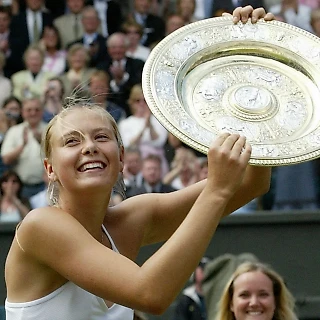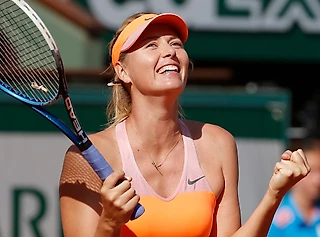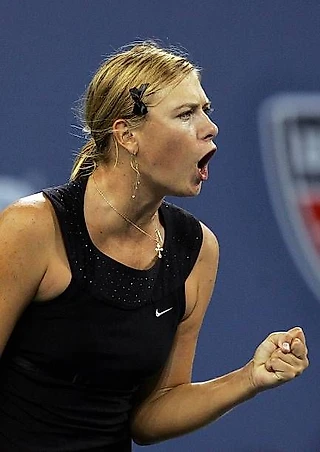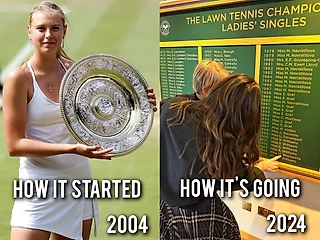РГ: Пресс-конференция Марии 07.06.2012
Выставил текст пресс-конференции Марии после полуфинала
MARIA SHARAPOVA June 07 2012
M. SHARAPOVA/P. Kvitova 6‑3, 6‑3
Q. You can call it a perfect day. Your first final here.
MARIA SHARAPOVA: Yeah.
Q. The spot of No. 1 in the world. How do you feel?
MARIA SHARAPOVA: Yeah. It’s just amazing to be back in this position of being world No. 1 again. Not yet. On Monday. But nice to know it happened again for me.
I was in a position a few years ago where I didn’t quite know if I would ever be here again on this stage playing professionally. And not just at that, but at a level to get to No. 1 in the world and a first Roland Garros final for me.
So a very special day, no doubt.
Q. Today it seems like nobody could have beaten you out there. You were so determined. Do you feel like maybe it’s the best match you’ve played this year? How were you feeling on the court?
MARIA SHARAPOVA: Well, it was tough to play a great match because of the conditions. I think most importantly it was about playing a solid match. I think patience was very important today, because in conditions like this, no matter how good you’re playing or bad, so many things equal out. If you get frustrated by a few mistakes, it can let you down.
I was also facing a tough opponent who’s given me a lot of trouble in the past. So, yeah, I was really happy that I was able to win in two sets today.
Q. Just talking about the comeback, I know people would assume that a player coming back from injuries straight back to the level that they left at, but if you could talk a bit about how it takes a while to build it up to that same standard.
MARIA SHARAPOVA: Yeah, those are exactly what you said: assumptions. It’s a long road back; it’s a long process. It’s a lot of days of frustration and uncertainty not knowing if you’ll ever get there, not knowing how much you want it, not knowing whether it would be a moment like that for you again.
So there’s definitely a lot of tough things you have to go through to get to this point, but when you get here and you look back at the things that you did and the work that you put in and the toughest days that you can remember, it’s all really worth it.
Because, I mean, I have played tennis since I was four years old. I committed myself to this sport. I’ve always loved what I did. When it was taken away from me for a while, that’s when I realized how grateful I was and how lucky I was to be playing it.
Q. The personal issues are also important. Is your mother with you? Do you think this has helped, or you are a lonely warrior? How is that?
MARIA SHARAPOVA: I’m a what? Lonely warrior? (Smiling.)
I have to look that up in the dictionary. I’m a warrior. I don’t know if I’m lonely.
I have always in my career had a small group of people in my box. Where you can give 14 tickets, you only see four people in my box, and it’s the way I’ve always been. I’m not the person to bring in friends and people that I’ve met for one day.
It’s not a show for me. It’s my career, and I take it very serial. You know, when I’m on the road, it’s the few people that are close to me, my team, my coach, my physio, my hitting partner, whoever it is, and then my family.
Those are the people that matter to me most during, you know, the good and the bad days and when you’re on the road.
Q. The No. 1 position has been changing quite a few times lately. Are you promising that you’ll keep it for a while now? And the second part of the question, the lady from the WTA, she seemed really excited about you being No. 1. For us journalists, it’s always exciting, I guess, maybe because you’re very charismatic ‑‑
MARIA SHARAPOVA: And shy.
Q. ‑‑ and different obviously. Do you think the women’s tennis really needed you or needs you really bad?
MARIA SHARAPOVA: I don’t know. That’s for you to judge, not me.
I mean, all I know is that I’ve worked hard to get to this place. Whether I’m charismatic or not, it’s really for you to determine, I guess. But I’m happy and I’m proud of where I came from and how I had to get here to this position.
Obviously I really hope that I can stay in this position. You know, it’s a spot that you always go for, but it’s also a spot that many others want and work hard for, as well.
But, you know, when you get there it’s always even tougher to keep it, so it’s certainly a challenge.
Q. During the time off your ranking went down and down and down and a lot of tears and the world is crashing around you. I’m sure those feelings were bad, but can you switch to today and just talk about when you won the match, feelings inside, what was coming out of you?
MARIA SHARAPOVA: Well, first, I was thinking that I won the match on the second serve ace.
Q. First one ever, I think.
MARIA SHARAPOVA: All right. Let’s not go crazy here. It wasn’t the first one ever. Maybe second.
Yeah, well, to be in a Roland Garros final for the first time when I know many years ago I’m sure many people in this room never considered me getting to this stage. And personally, I mean, I’ve always believed and I have worked towards it, but I didn’t quite know if I was really ever physically quite ready for that.
So, yeah, to be in this stage for the first time in my career, 25 years old, is just a great personal achievement.
Q. Saturday you’re going to be playing a final in order to get the only missing Grand Slam tournament in your career. So it’s very important. You’re going to encounter kind of an outsider player. Would you have preferred playing somebody you have played much more at those stages, or how is it going to feel to play against an outsider?
MARIA SHARAPOVA: Well, it doesn’t really matter what I prefer. I mean, at the end of the day it’s who gets to the final on the other side. You know, for me it’s going to be Errani, someone who I think has won the most clay‑court matches this year. She’s been so great on this surface. It’s her favorite surface to play on.
The way she’s been competing in the last two weeks, I mean, I’ve seen a lot of her matches. Not all of them, but saw a little bit today, you know, the way she competes and moves and, you know, gets herself back in position, makes you hit a lot of balls.
She’s certainly a very dangerous player. It’s also a first for her to be in the finals here. Yeah, it’s not something that, you know, you prefer or not prefer. It doesn’t really matter. It’s whoever you have to face.
Q. Even if you both are 25 years old, there is a little difference: 24 inches, centimeters, 21 tournaments.
MARIA SHARAPOVA: Here we go. Get your pillows out, guys. (Laughter.)
Q. Three slams, 21 tournaments and so on, so many other things.
MARIA SHARAPOVA: Yes.
Q. What is really the difference? I mean, how do you compare those things? The fact that you have so much more experience than her? Do you think it’s a great advantage, or she has nothing to lose so it’s almost even at the start?
MARIA SHARAPOVA: Well, maybe that’s something we can talk about after the final. But, I mean, I’m certainly grateful for the experience that I have. Experience I think is priceless. It teaches you so many things. Winning, losing, situations, circumstances that you go through.
But, yeah, I can’t speak for obviously how she’s feeling, but I’m just excited to be in this position. Whether I’m playing against someone that hasn’t been there or not it doesn’t matter. At the end of the day it’s another match, and we have to go out there and compete and perform well.
Whoever is going to be better on that day will win the match.
Q. Given the way that the match did end, I just wondered if you know how many serves you may have hit this year in practice, you know, outside courts when you’ve been out there with Thomas going through it over and over and over again? Have you ever hit as many serves perhaps in practice or in matches as you’ve hit this year?
MARIA SHARAPOVA: Yeah, probably more.
Q. More?
MARIA SHARAPOVA: Yeah, probably. I don’t really count.
Q. No, but it’s something you have been really working very hard on.
MARIA SHARAPOVA: Yeah, of course.
Q. To actually reach a final in that manner is quite a reward.
MARIA SHARAPOVA: Yeah, it’s definitely something that I knew. I mean, the day that I got shoulder surgery I knew it was something I’m going to be working on and trying to get back for a very long period of time.
I mean, it was the most painful shot for me before I had to get surgery, and I knew that it could have still been painful after. It certainly was for a period of time.
I always knew that I ‑‑ I mean, that’s why in the beginning I kind of had to start with a different motion because I couldn’t have a long swing when I got back. Just my arm, I would just get pain right away, so I had to, you know, change a few things around.
But, you know, you’ve got to do what you’ve got to do sometimes.
Q. Yesterday you talked about the Japanese trainer you started working with. I’m guessing it’s Yutaka.
MARIA SHARAPOVA: Uh‑huh.
Q. Could you talk a little bit about when you started working with him again? Where are you training? It’s Florida or Los Angeles?
MARIA SHARAPOVA: Yeah, I’ve worked with Yutaka when I was a young girl because he trained in Florida. He was part of the program there. Then he left for a couple of years to work for Tennis Australia. He ended the job there and I kind of stole him. It was a combination.
Yeah, I mean, he’s still based in Florida, and we work there. He travels a bit. When I’m in California he comes there. When I’m in Florida he’s home, so he’s there.
Q. Comparing this final to the ones you won ‑ US Open, Wimbledon, and the Australian Open ‑ in which year you had the best approach? In which you get in the best condition?
MARIA SHARAPOVA: Oh, yeah, I don’t know. Best condition?
I mean, all of them were pretty difficult. I mean, can’t really count Wimbledon because I had absolutely no expectations there.
The US Open I felt like I was ready to win my second Grand Slam there. I don’t know why. It was just a feeling I had. I was playing, you know, extremely good tennis.
I mean, it’s really tough to compare. Every situation is different. Look, there are times when you feel really great and you come out and nothing seems to work.
There are times where before the Wimbledon final I had a fever, I was sick, and I thought I maybe couldn’t even play. I was really worried. I went out, and it was like nothing bothered me.
So I don’t know. Just depends.
Q. Hopefully if you get the win here Saturday…
MARIA SHARAPOVA: Maybe you can ask me after?
Q. Yes. Do you think that your mom, you would say to her, Well, stay throughout Wimbledon; I’m not gonna let you go home? Would she be scared of you not letting her go back home because you’re doing so well with her?
MARIA SHARAPOVA: I mean, I don’t feel that bad for her. She’s been in Rome, Madrid, Paris, walking the streets, shopping, going to museums. I don’t think she would mind if I tell her that.
But, yeah, I mean, I’m happy when she travels with me. It makes my life so much easier, and she’s just such a calm influence for me. Yeah, I always enjoy whether it’s on the road or at home. We’re very good friends.
Q. Can you talk a little bit about resiliency? You have had some tough losses in finals this year, but you just keep coming back and back and back. Doesn’t seem like they bother you that much, and now you’re back in another big one. How do you deal with it, and how do you realistically put them behind you and not think about them?
MARIA SHARAPOVA: Well, I mean, it’s about understanding that you did something well enough to get to that position, to get into the finals, and about realizing that when you get to the finals, I mean, you’re not done. You know, you have to keep going. You have to keep playing with the same intensity, same level. You’ve got to be even better.
That’s pretty much the way to look at it. But, I mean, resiliency is important, because if you let things get to you and losses and words and negative things, then it can be frustrating.
But, I mean, after I came back from injury I’ve been much better at not allowing those things to bother me. Results, and, you know, little things that can maybe, you know, make your mind go crazy, they don’t bother me so much now.









Российская теннисистка Мария Шарапова заявила, что относится к спортивной карьере очень серьезно и не собирается делать из нее шоу.
Россиянка в четверг впервые вышла в финал «Ролан Гаррос» и вернула себе первое место в рейтинге Женской теннисной ассоциации.
Редакция агентства «Р-Спорт» провела текстовую трансляцию матча Квитова - Шарапова >>
«Всю мою карьеру меня сопровождает маленькая группа людей, - сказала Шарапова на пресс-конференции. - Игрокам дают 14 билетов на матч, но в моей ложе вы видите только четырех человек. Я не тот человек, который приводит друзей и людей, с которыми познакомилась накануне. Все это не шоу для меня, а карьера, к которой я отношусь очень серьезно».
Теннисистка добавила, что на турнирах с ней всегда находятся ее тренер, физиотерапевт, спарринг-партнер и может быть кто-то из родственников. «Все эти люди много значат для меня, которые всегда со мной в плохие и хорошие времена», - подчеркнула она.
В Париже Шарапову сопровождает мама, которая была с теннисисткой на протяжении всех грунтовых турниров в этом сезоне.
«Не думаю, что ей это в тягость. Она была в Риме, Мадриде, Париже, гуляла по улицам, ходила по музеям и магазинам. Не думаю, что она считает, что я заставлю ее ездить с собой. Да, я счастлива, что она здесь. Она значительно облегчает мою жизнь, вносит необходимое мне спокойствие. Мне нравится быть с ней, неважно где - дома или в путешествиях. На самом деле, мы очень близкие друзья», - рассказала теннисистка.
В финале «Ролан Гаррос» Шарапова сыграет с итальянкой Сарой Эррани.
«Я особо не думала, когда сезон начался, что я буду на грунте так работать и что-то для этого специально делать, - сказала Шарапова на пресс-конференции. - Когда завершился турнир в Майами, я начала подготовку к грунтовому сезону, занималась ОФП (общей физической подготовкой), добавила в свой график дополнительный турнир в Германии. Я просто думала, что предстоит тяжелое лето, Олимпиада, потом US Open. Когда я составлял график, в первую очередь думала о том, чтобы остаться здоровой».
В полуфинале турнира во Франции россиянка обыграла чешку Петру Квитову в двух сетах со счетом 6:3, 6:3. «Сегодня самым важным было сохранять терпение, так как матч проходил в непростых условиях (откладывался из-за дождя). Я встречалась с соперницей, которая раньше доставляла мне немало проблем, и, конечно, я счастлива, что мне удалось обыграть ее сегодня в двух сетах», - заметила Шарапова.
Говоря о своем возвращении на первое место в рейтинге, теннисистка призналась, что еще пару лет назад даже не думала, что когда-то это произойдет.
«На самом деле тяжело сравнить свои чувства, когда я впервые стала первой ракеткой мира и сейчас, потому что два-три года назад я не представляла, что у меня будет шанс стать первой ракеткой мира. Я старалась не думать об этом, для меня главным было выйти на свой высокий уровень, доходить до финалов, выигрывать турниры. А рейтинг у меня был тогда где-то в сотне. Тогда я думала: у меня была мечта, когда я была маленькая, стать первой ракеткой мира, и может быть у меня получится это опять. Но без сомнения, сегодня - особенный день для меня», - рассказала она.
По словам Шараповой, она считает свой выход в финал Открытого чемпионата Франции серьезным достижением. «Знаете, здорово быть впервые в финале «Ролан Гаррос», когда на протяжении многих лет большинство из вас, сидящих в этой комнате, никогда не считали, что я могу добраться до этой стадии турнира. Лично я всегда верила в это, но точно не знала, готова ли я была физически для этого. Считаю, что в 25 лет добраться впервые до финала здесь - это огромное личное достижение», - подчеркнула она.
За титул Шарапова поборется с итальянкой Сарой Эррани, которая на пути в финал выбила из турнира чемпионок прошлых лет россиянку Светлану Кузнецову и сербку Ану Иванович, а также финалистку «Ролан Гаррос»-2010 австралийку Саманту Стосур. Ровесницы Шарапова и Эррани никогда прежде не играли между собой.
«В этом сезона она отлично играет на грунте, это ее любимое покрытие. Я видела большинство ее матчей здесь. Сегодняшний (против Стосур) видела немного. Она борется и очень хорошо двигается. На самом деле, она очень серьезный соперник, и для нее финал здесь также первый в карьере», - сказала теннисистка.
Шарапова не стала сравнивать свои ощущения перед каждым из финалов турниров Большого Шлема, в которых принимала участие. «Все они были очень разными. О моем первом финале на Уимблдоне (2004 год) вообще нельзя говорить, потому что у меня тогда не было никакого опыта. На US Open (2006) у меня почему-то было чувство, что я готова выиграть свой второй Большой Шлем. Не знаю, почему. Но тогда я играла в невероятно хороший теннис. Нельзя сравнивать, все зависит от обстоятельств», - резюмировала она.